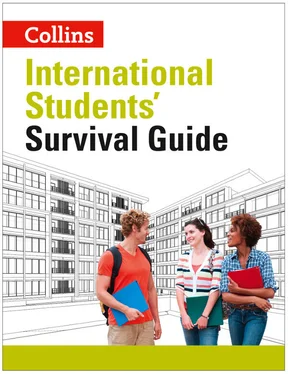Try to make friends with people who don’t speak the same first language as you. This doesn’t necessarily have to be native speakers of English. Being friends with other international students from other parts of the world who don’t speak the same first language as you will mean that you have to speak English to communicate. Although it seems very comfortable and safe to make friends with people of the same nationality as you, you will not improve your English or learn the host culture or learn about other cultures in any deep way. Remember that college/university abroad is about much more than just your degree. You’re also improving your foreign language skills, and learning about a new culture.
What kind of accommodation is best?
Try to live with native-speaker students, or at least a mix of nationalities. If you live with your own nationality, it makes it more difficult to meet native-speaker students. One of the best ways to do this, if you’re an undergraduate, is to live at the dormitory/student halls of residence. There’s always lots going on and lots of people to talk to in these places, and there’s often a sense of community.
Another great option that is often available to college- and university-level students is a homestay. In a homestay, you’ll live with a local family. At their best, homestays provide many benefits such as:
better speaking and listening skills because of the opportunities to practice with the family;
detailed cultural knowledge;
a view of life “from the inside” of a culture;
a quieter living option than the typical dormitory or shared apartment;
people who look after you and can help you;
a home environment;
experience with children and the elderly, who you don’t often interact with on a college/university campus.
What if you’re just not meeting people from the host country?
If you do end up spending time with other students who speak the same first language as you, make an agreement with your friends to speak in English at all times. The key is to make yourself aware of the fact that you can’t keep going back to your first language. This way you’ll still get to practice English.
Don’t stay in constant contact with home! Some students try to call home every day, or at least several times a week. This is a big mistake. You’ll make it harder for yourself to adjust to your new place and life if you’re always thinking about what’s going on in your country. You’ll also lose your focus on what you’re doing: studying. You need to explain to your friends and family at home that you need to focus now. Make a plan to contact them once a week if necessary, but not more than that unless there’s a problem. Also remind them that it’s best if you’re not told about every problem and crisis at home. This can cause a lot of stress and worry for international students. It’s often difficult for the family and friends back home who have not studied abroad to understand just how stressful it can be for you to constantly hear about crises that you can’t do anything about.
Finding friends at your college/university
Whether you’re trying to make friends with local students, or just want to feel like you’re really involved in the life of your new college, there are usually many different opportunities for you to become an important part of your college or university’s social life.
On many college/university campuses, there will be a student union or common building that will have many different events happening. These are usually the social heart of the college. From rock concerts to free classes, there is usually much more going on than you could possibly have time for!
At many colleges/universities, there are opportunities for students to become involved in the political planning and activities of the college. Student councils’ members work with the college or university’s administrators. They represent the students and help with decision-making on policies at the college or university. These are usually voted-for positions, so even the process of trying to become a council member will help you meet and network with many different types of people across the campus.
Clubs/Student organizations
Depending on the size of your college or university, there should be many different clubs to join. These clubs give you a perfect opportunity to meet other students who share the same interests as you. In the UK these clubs are usually called “societies.”
The clubs are usually focused on things such as:
sports;
foreign languages;
music (anything from booking bands to playing in one);
film;
art;
dance;
subject-based, academic clubs (astronomy, history);
political groups;
martial arts;
religious groups;
interests (baking, knitting, gaming, books);
sober (people who don’t drink alcohol) social groups (a great option for people who don’t like drinking or who can’t drink due to religious beliefs or health issues).
In Australia, many campuses have an International Students’ Society which you may like to join.
Fraternities and Sororities
In the US, there’s the opportunity to join a fraternity (for men) or sorority (for women) on many campuses. These are formal, lifelong organizations that usually involve much of your social time being spent with your fraternity and sorority “brothers” and “sisters.” The process of joining a fraternity or sorority is long and involves many rituals and meetings, where both you and the house decide if you’re a good fit for each other. It’s a good option for people who want a very strong social network, but it’s not suitable for everyone.
Foreign language exchange
Many foreign students meet native-speaker students through foreign language exchanges. When you find a partner, usually through the foreign language departments of your college/university, you then meet regularly with your partner. Usually, one hour is spent speaking in your language, and the other hour in English. Many strong friendships have been formed this way, and even if you don’t become friends, it’s a great way to help other students learn more about your language and culture, while you learn from them.
Many colleges and universities encourage students to become a part of the wider community than the college is in. English-speaking countries have a long history of charity and charity organizations that are run for the most part by volunteers who work without pay. Students in the social sciences such as social work might enjoy working with the elderly, for example. There is usually a charity organization to fit any area of interest that you might have from helping with homelessness or working with wild animals.
Pretty much every religion is represented in English-speaking countries. Going to mosque, for example, is usually possible wherever you study. Students will often meet native-speaker Muslims in that situation, for example, which can mean an easier friendship due to having similar values or beliefs. Most religious institutions in English-speaking countries, of course, are Christian. These churches will often have many different social organizations attached to them. Many churches throughout the English-speaking world have strong ties and experience with charity organizations in the community. Many also have “international friendship” groups that like to reach out to foreigners in the area. If there isn’t a group like this on your campus, there’s likely to be one in the wider community. These groups don’t usually try to change your mind about your religion, but rather offer friendship and opportunities to get to know the locals.
Читать дальше












